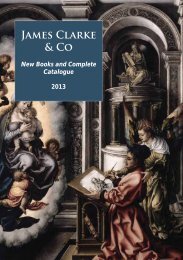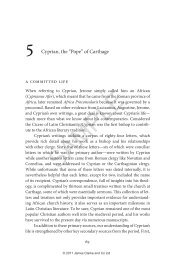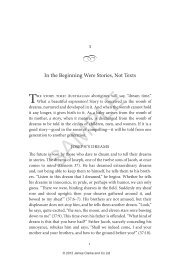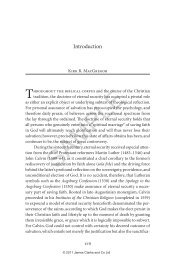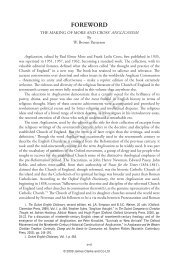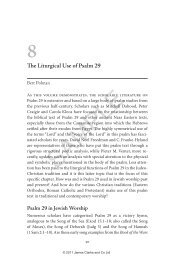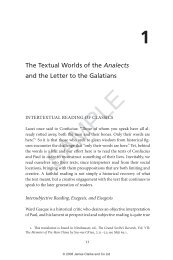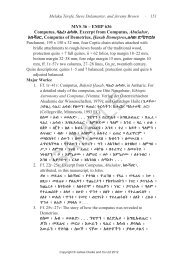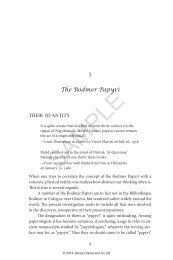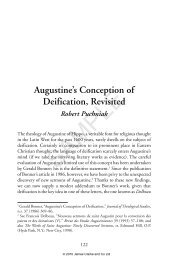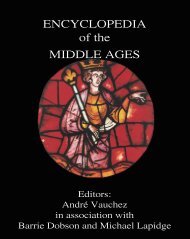Chapter 3: The Spatiality of God - James Clarke and Co Ltd
Chapter 3: The Spatiality of God - James Clarke and Co Ltd
Chapter 3: The Spatiality of God - James Clarke and Co Ltd
You also want an ePaper? Increase the reach of your titles
YUMPU automatically turns print PDFs into web optimized ePapers that Google loves.
Rae—<strong>The</strong> <strong>Spatiality</strong> <strong>of</strong> <strong>God</strong><br />
85<br />
creatures is realized in ways yet unimaginable? It is difficult to make<br />
any sense <strong>of</strong> the creedal statement <strong>of</strong> belief in the resurrection <strong>of</strong> the<br />
body if there is not in <strong>God</strong>’s presence somewhere for bodies to be. <strong>The</strong><br />
promise that there are many rooms in my father’s house, need not be<br />
taken literally as a description <strong>of</strong> heavenly architecture, in order to<br />
accept its assurance that, eschatologically speaking, there will be space<br />
for us with <strong>God</strong>.<br />
Nor is it easy to sustain belief in the bodily resurrection <strong>of</strong> Christ,<br />
towards which the New Testament witness clearly points, if there is now<br />
no place for the risen <strong>and</strong> ascended Christ to be. He sits at the right<br />
h<strong>and</strong> <strong>of</strong> <strong>God</strong>, it is said, where he sustains all things by his powerful<br />
word (Heb 1:3). That location is not somewhere that we can point to,<br />
for it is not to be found in our space but in <strong>God</strong>’s. But his presence there,<br />
his having a place there, a place he occupies eternally, must be said, on<br />
the basis <strong>of</strong> the divine economy, to be the antecedent condition <strong>of</strong> our<br />
having space at all.<br />
<strong>Co</strong>nclusion<br />
I began this paper with the question, in what way does the spatial expression<br />
<strong>of</strong> the conceptual reality with which theology is concerned correspond<br />
to the being <strong>of</strong> <strong>God</strong>? Does the spatial language commonly used<br />
in theology have some purchase on the reality <strong>of</strong> <strong>God</strong> beyond what we<br />
might call the merely metaphorical? Barth, I think, helps us to see that<br />
space is only secondarily a determination <strong>of</strong> the creature. It is, in the first<br />
place, the freely chosen condition <strong>of</strong> <strong>God</strong>’s threefold differentiation as<br />
Father, Son, <strong>and</strong> Spirit, the condition under which there is both proximity<br />
<strong>and</strong> distance in the being <strong>of</strong> <strong>God</strong> <strong>and</strong> thus personal distinction <strong>and</strong><br />
communion. Barth says, therefore, that <strong>God</strong> has his own space. Indeed<br />
here it is revealed what space truly is. It is possible then to say that spatial<br />
language used in theology need not always be a figure <strong>of</strong> speech. As<br />
<strong>God</strong> has space for himself, for the triune communion that constitutes<br />
his own life, so he creates space for us. Our space, distinct from <strong>God</strong>, is<br />
nevertheless the space in which <strong>God</strong> makes himself present, generally<br />
throughout creation, but most especially in Christ. We ought to take<br />
this literally. In Christ, as the letter to the <strong>Co</strong>lossians puts it, “the whole<br />
fullness <strong>of</strong> deity dwells bodily” (<strong>Co</strong>l 2:9). <strong>God</strong> is wholly present there.<br />
On account <strong>of</strong> his presence there for us, we are assured that <strong>God</strong> has<br />
SAMPLE<br />
<strong>Co</strong>pyright © <strong>James</strong> <strong>Clarke</strong> <strong>and</strong> <strong>Co</strong> <strong>Ltd</strong> 2012



